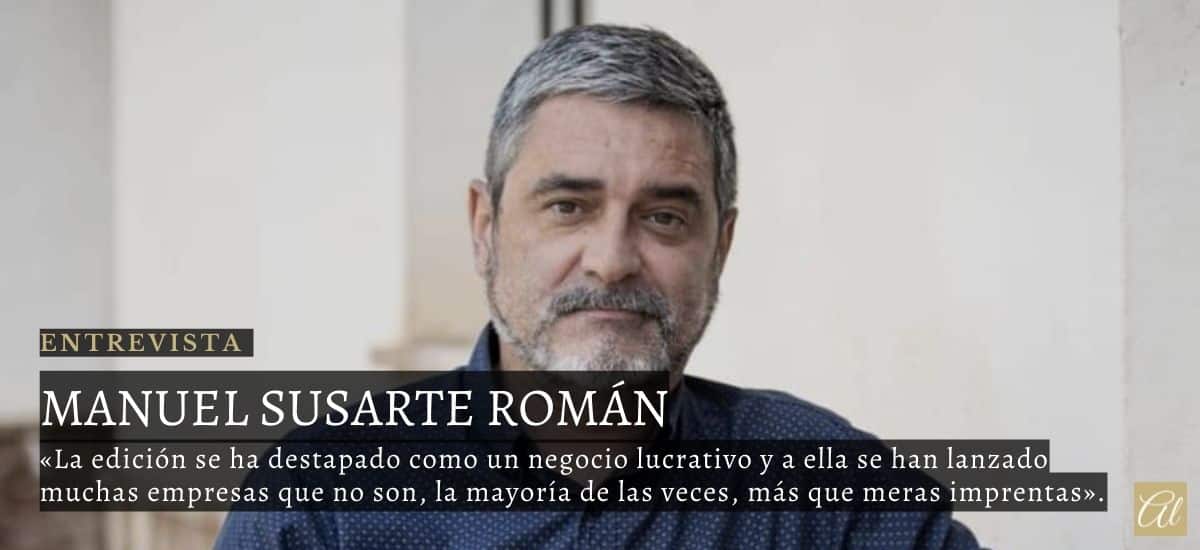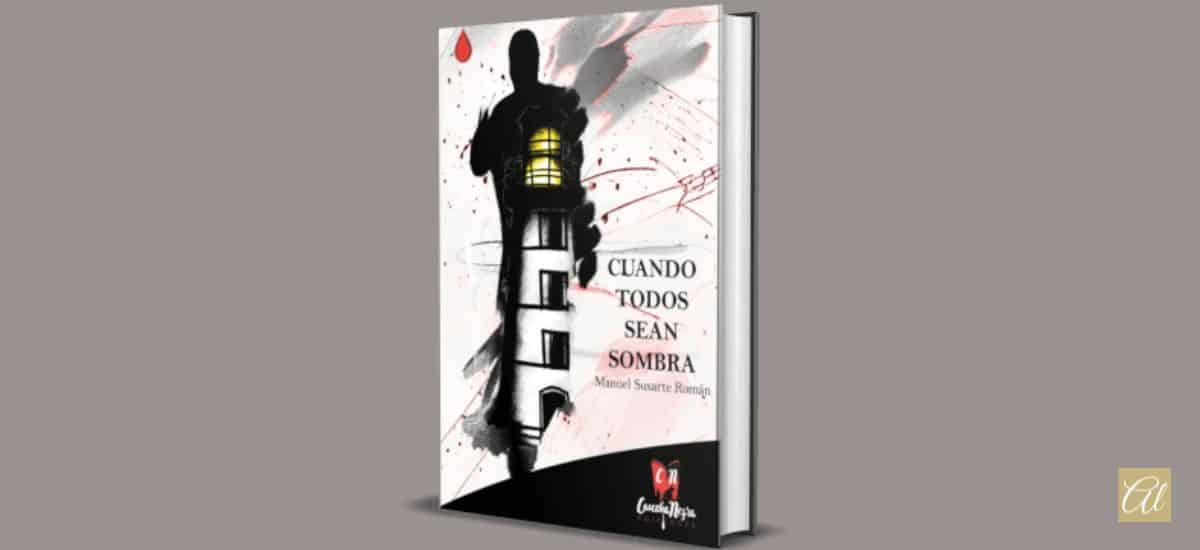
Manuel Susarte Roman He was born in Mula (Murcia). He premiered with his first novel, Atropia, in 2021 and this December he presented his second, When everyone is shadow which is his first inclusion in the noir genre. Thank you very much for taking care of me for this extensive interview where he tells us about her and several other topics.
Manuel Susarte Román — Interview
- ACTUALIDAD LITERATURA: Your new novel is entitled when everyone is shadow. What do you tell us about it and where did the idea come from?
MANUEL SUSARTE ROMAN: In it I tell a classic cop story: the protagonist who tries to stop his antagonist, thus preventing the number of victims from increasing. But I think I do it from a novel approach, both for the description of the facts and for the characteristics of said antagonist. This set to early eighties, which is a time that fascinates me, not only for having lived through it, but above all for the profound changes that were carried out in our country: the structure inherited from the dictatorship began to crack and a new generation struggled to occupy those spaces in the street, on stage, in politics. And all with a city like Cartagena Bottom line, what more could you ask for.
La idea arose, like so many good things, from a coffee chat with my friend Jesus, who planted it in my mind. There it grew until I had the need to put it in writing. Already, in the documentation phase to give it shape, the story that opened up in my imagination was conquering me until it ended up becoming a novel.
- AL: Can you go back to that first book you read? And the first story you wrote?
MSR: I couldn't tell you what my first book was, since I was a very early reader. I can tell you about some textbooks of the GBS called PATH and that they collected fragments of novels; I read them over and over again. My childhood was spent reading the adventures of The fivethose of mischievous william and, above all, to Julio Verne, whose complete works my parents gave me. Curiously, I do remember the first book I personally bought (saving from the five duros weekly salary they gave me): an edition of the travels of marco poloA copy that I still have.
I also remember the first story i wrote: it was about a ladybug that the rest of the insects messed with (at that time the word was not yet used bullying) and that to escape from his sad reality he decided to build a rocket with which to travel to the Moon. Flying ladybug almost in orbit it was called. I would have been about seven or eight years old.
- AL: A head writer? You can choose more than one and from all eras.
MSR: They must be several by force. I have already said that I grew up traveling from the Earth to the Moon, accompanying Michael Strogoff through the icy steppe, surviving two years with my class on a deserted island, thanks to Jules Verne and that is my first reference (even if it is chronological). Also, no doubt, Umberto Eco; Scott Fitzgerald; the classics of our Golden age...
All of them in terms of those who have always accompanied me, and if we talk about my bedside table, I have an eternal debt with Stephen King, not only for partly shaping my style, but for giving us his son Joe hill; James Clavell... If we talk about Spanish authors, he would head the podium Arturo Perez-Reverte, closely followed by John Slav Galán, Cela, Vazquez Montalban… As you can see, it's hard for me to choose.
- AL: What character in a book would you have liked to meet and create?
MSR: I would have loved it can bring to life a Sherlock Holmes, definitely. I am fascinated by that character that ends up becoming a genre in itself, inventing a profession, creating a type of novel and that, along the way, devours its creator. and I would have liked know To the most universal of those born of the Spanish pen: the Quijote. When all the other characters are no longer even a vague memory, the name of Cervantes, together with that of Alonso Quijano, will continue to be recognized.
- AL: Any special hobby or habit when it comes to writing or reading?
MSR: I don't have hobbies at the time of reading, any place and time are good. I prefer paper, but I'm not disgusted by other supports. How many waits will not have relieved me a ebook read on mobile! As to write yes i have some: I write by hand, with a pen and listening to music.
- AL: And your preferred place and time to do it?
MSR: I prefer to write in my office, late afternoon. But when I feel the need to do it (because I've had an idea or because the perfect scene, the witty conversation, the pertinent comment comes to mind) I take advantage of the place where I find myself, be it a break from work or inside the car in a parking. Despite this, I like to dedicate a couple of hours a day to writing in my office, something that is not always possible.
- AL: Are there other genres that you like?
MSR: Yes, i'm pretty eclectic in my readings and I hope that is reflected in my writings. The mystery and supernatural horror are my favourites, but I also like history books and historical novel, especially the one set in the XNUMXth and XNUMXth centuries, the satirical and humorous novel, the essay. The only thing that doesn't quite hook me is poetry, I guess that moment in my life hasn't arrived yet.
- AL: What are you reading now? And writing?
MSR: I am a reader of several books at the same time. now i'm with Bilbao-style ratatouille, by José Francisco Alonso and simultaneously with The eternal barefoot, by Marcos Muelas and The day D, by Antony Beevor. I'm with the rewrite of a novel I finished last year Witches, spells and cinnamon sticks, set in XNUMXth century Spain. And I also write a new story of Imanol Ugarte, the protagonist of when everyone is shadow.
- AL: How do you think the publishing scene is?
MSR: I think that, paradoxically, it is immobile when it seems most dynamic. The publishers that are only in name, specialists in living off the money of the authors instead of the money generated by them. In 2019, the last year for which statistical data is available, more than 80.000 books were published in Spain (more than readers, according to a friend of mine). That makes everything confusing.
We all seem interested in the same topics, in the same authors and it is because the marketing and advertising media are in the hands of three or four large publishers who constantly bombard us with their products and the rest of the authors try to survive on social networks. The bookstores are full of premade hits by the two large corporations (although there are a thousand publishers, most belong to those two large groups that we all have in mind). Meanwhile, the independent proposals, the new authors who may have interesting stories to tell have to compete among themselves to get a place in the least lit corner of the premises.

The latest novel by Manuel Susarte Román
The writers who need less publicity are, ironically, those who have the most media presence. Publishing has emerged as a lucrative business and many companies have been launched there that are, most of the time, more than mere printers.
As you will see, I am quite pessimistic regarding this topic. Despite this, there is also new proposals, people who decide to publish risking everything and moved by the love of a job well done, small publishers that make books worth reading. The reader who is interested in enjoying the great variety of worlds that exist outside of best sellers in turn you can do it by searching a bit.
- AL: Is the moment of crisis that we are experiencing being difficult for you or will you be able to keep something positive in both the cultural and social spheres?
MSR: Fortunately, the crisis has not hit me directly and although we all notice it as a collective, in my environment we remain more or less the same. As for culture, the crisis is something endemic, transgenerational. But thinking positively, the pandemic and the consequent economic recession have paradoxically increased the number of readers. In books we have found relief and escape to soften the difficult situation that we have gone through as a society. People have read more and this has been noticed in bookstores, in libraries. Hopefully this is a trend that is here to stay.
However culture in general and literature in particular (for being the part that touches me) They continue to need the support and encouragement of the official bodies. A determined commitment to promote the necessary actions, such as grants for creation, publicity for authors, investing in cultural events (beyond the obligatory photo-taking act), book fairs, etc. Because if we leave our culture in the hands of a few (and their mercantilist interests) we run the risk of ending up standardizing ourselves as a society. And that, as the blind man said, I prefer not to see.